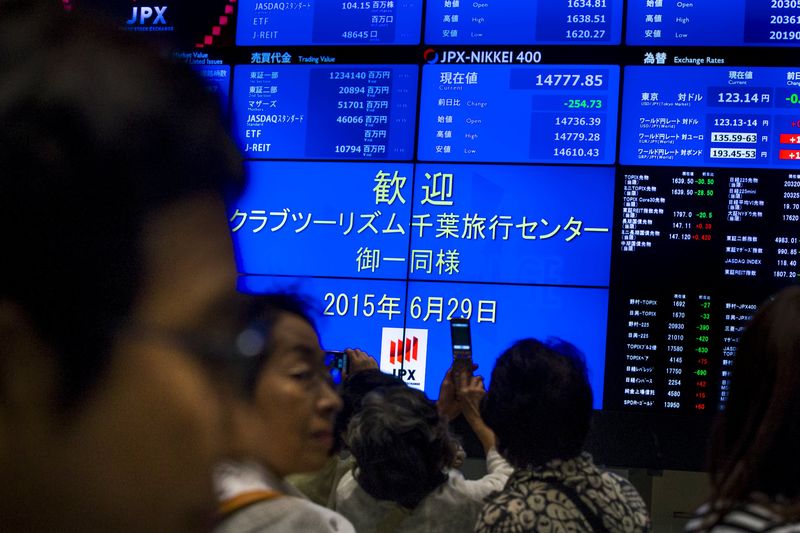* Asian stock markets : https://tmsnrt.rs/2zpUAr4
* ECB downgrades growth outlook, offers cheap loans
* Dollar and yen surge as euro takes a spill
* Nikkei falls 1.6 pct, Shanghai blue chips off 2 pct
* Bond yields drop globally on bets for more easing
By Wayne Cole
SYDNEY, March 8 (Reuters) - Asian stocks shuddered lower on Friday after the European Central Bank slashed its growth forecasts and surprised everyone with a new of policy stimulus, leaving investors fearing the worst for the global economy.
ECB President Mario Draghi said the economy was in "a period of continued weakness and pervasive uncertainty" as he pushed out a planned rate hike and instead offered banks a new round of cheap loans. reversal came in the same week that Canada's central bank took a sudden dovish turn and dismal data from Australia to the UK instilled a sense of foreboding in markets.
"When central banks surprise like this some investors wonder whether that infers things are much worse than they thought," said Gavin Friend, a senior market strategist at NAB.
"Our initial take is these developments are pressing down on market confidence, seen in lower bond yields and equities."
Yields on German and French 10-year bonds dived to their lowest since 2016, while banking stocks took a beating. The euro duly sank to depths last seen in mid-2017, sending the safe-haven U.S. dollar and yen surging.
In Asia, Shanghai blue chips .CSI300 slid 2.0 percent to retrace some of their recent stellar gains, while the dollar climbed on the yuan.
Japan's Nikkei .N225 dropped 1.6 percent and Australia .AXJO 0.8 percent. MSCI's broadest index of Asia-Pacific shares outside Japan .MIAPJ0000PUS skidded 1.1 percent to a two-week trough.
E-Mini futures for the S&P 500 ESc1 dithered either side of flat after a weak close for Wall Street. .N
The Dow .DJI fell 0.78 percent, while the S&P 500 .SPX lost 0.81 percent and the Nasdaq .IXIC 1.13 percent. The closely watched Dow Jones Transport Average .DJT fell for a 10th straight session, the longest streak since February 2009.
EURO IN A HOLE
The next hurdle for investors will be U.S. payrolls data for February, with analysts uncertain how much payback there might be for January's outsized jump. There was also a chance the jobless rate could fall by more than forecast given the recent strength in employment.
The numbers are still likely to highlight the relative outperformance of the U.S. economy, especially against the European Union, and further encourage dollar bulls.
The greenback reached a new 2019 high against a basket of currencies and was last at 97.627 .DXY .
The euro EUR=EBS cowered at $1.1189, having suffered its biggest one-day loss against the dollar since June 14, 2018 when the ECB last pushed back plans for a rate hike. euro also shed over 1 percent on the yen overnight and was last trading at 124.70 yen EURJPY= . The Japanese currency was one of the few to hold its own on the dollar at 111.50 JPY= .
"The ECB's updated forecasts imply that, at best, growth slowly returns to trend over the next few years, meaning it will be very difficult to get underlying inflation up," wrote analysts at ANZ in a note.
"Euro interest rates could be at current levels into 2021. That is not good news for euro area banks or the euro."
In commodity markets, the rise in the dollar restrained gold to $1,286.27 per ounce XAU= .
Oil prices eased as U.S. crude output and exports climbed to record highs, undermining efforts by producer club OPEC to tighten global markets. O/R
U.S. crude CLc1 was last down 32 cents at $56.34 a barrel, while Brent crude LCOc1 fell 39 cents to $65.91.
<^^^^^^^^^^^^^^^^^^^^^^^^^^^^^^^^^^^^^^^^^^^^^^^^^^^^^^^^^^^ Asia stock markets
https://tmsnrt.rs/2zpUAr4 Asia-Pacific valuations
https://tmsnrt.rs/2Dr2BQA
^^^^^^^^^^^^^^^^^^^^^^^^^^^^^^^^^^^^^^^^^^^^^^^^^^^^^^^^^^^> (Editing by Sam Holmes & Shri Navaratnam)
